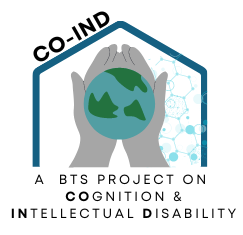
Investigating Cognition in Intellectual Disability
The project is an international collaboration aiming to bring together researchers working on intellectual disability across different institutions in many countries around the world. Together, we will collect data forming a common database enabling a well-powered and comprehensive study of intellectual disability and cognition.
Our Registered Report
We have received an in-principle acceptance (IPA) from PCI Registered Reports for a programmatic registered report. The manuscript includes the two core studies and two additional studies, all marked below. To find out more, you can check the Registered Report IPA and read the manuscript.
Our 11 Studies
The core advisory group of the project agreed on the design for the core protocol that will be adopted by all participating research groups. There are two main studies included in the core protocol:
- Developmental trajectories of executive functions and adaptive behaviours in children and young people with intellectual disability.
- Transdiagnostic profiles of executive functioning and adaptive behaviours in intellectual disability.
Both are included in the registered report.
In addition to the two core studies, our collaborating teams have proposed 9 further studies extending the project’s protocol beyond the core aims. These 9 studies will form separate publications. The following topics will be included:
- Daily routines and technological involvement in families of children and adolescents with intellectual disability. Coordinated by Juan Giraldo-Huertas, Universidad de la Sabana, Colombia & Santiago Alonso, Tecnológico de Monterrey, México.
- The Presentation of Emotional Well-Being Across Individuals with an Intellectual Disability. Coordinated by Caroline G. Richter, University of Alabama at Birmingham, US.
- Mastery Motivation Across Individuals with an Intellectual Disability. Coordinated by Caroline G. Richter, University of Alabama at Birmingham, US.
- In the registered report General fluid intelligence, Executive functions and their relations to phonological awareness in children with intellectual disability. Coordinated by Lisa Palmqvist, University of Gothenburg & Karin Nilsson, Linköping University, Sweden.
- In the registered report Participation, adaptive behaviours, and executive functioning in adolescents with intellectual disability. Coordinated by Marta Topor and Henrik Danielsson, Linköping University & Karina Huus and Mats Granlund, Jönköping University, Sweden.
- Expressive drawing in children with intellectual disability and their relation to child’s mood and development. Coordinated by Sebastian Unger, Christina Niedermann, Jan P. Röer & Thomas Ostermann, Witten/Herdecke University, Germany.
- The relationship between number magnitude processing and executive functioning in adolescents with an intellectual disability. Coordinated by Nina Klang, Anna-Lena Andersson & Helena Tegler, Mälardalen University, Sweden.
- A Comparison Between Individuals with Intellectual Disability and Typically Developing Peers Matched for Non-Verbal Mental Age in Executive Functions and Adaptive Behavior. Coordinated by Elisa Rossi, Silvia Lanfranchi & Sara Onnivello, University of Padua, Italy.
- Longitudinal Association among Processing Speed, Executive Functions, and Adaptive Behavior in Individuals with Intellectual Disability. Coordinated by Yoshifumi Ikeda Tokyo Gakugei University, Japan.
Advisory Board
Project Coordinators
The Conceptualisation and Advisory Team
Our Team
There are 37 research groups currently involved in the project.
We are spread across 23 countries and collect data in 21 languages.
We also collaborate with experts who contribute to the project by providing advice on methodological design and data analysis.
Many students are involved in the project. They are writing their theses on the collected data.

Contribution Opportunities
The Culture of Collaboration and Inclusion
We take on a Big Team Science approach with a focus on collaboration and inclusion. All elements of the project, from its very conception, have been driven by collaborative efforts of experts in the field. Therefore, this project presents a fantastic opportunity to contribute to a thoroughly planned and organised programme of research that aims to tackle pressing questions in the field of cognition and intellectual disability. The field currently struggles with issues around methodological heterogeneity and low statistical power. We can overcome these barriers together by joining forces and conducting a study that will have a real impact on the field’s development and future direction.
As a contributor, you will become a co-author on the main publications from the project. So far we predict at least two such publications. In addition, depending on your specific interests, you will have a chance to propose additional research questions or contribute to exploratory studies/analyses that may result in further publications and new collaborations for your team.
If you are interested in the project and consider joining our collaboration
We are no longer accepting expressions of interest for potential project collaborators.
However, there may still be opportunities to contribute depending on which stage of the project we are at. If you are interested and would like to know more, contact us via this email address: coind-project@liu.se. We can arrange a meeting to discuss the project’s progress and your potential role as a contributor.
Here you can access our Code of Conduct.